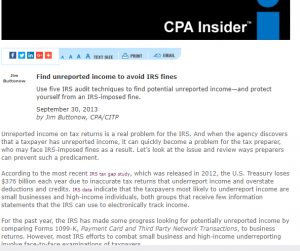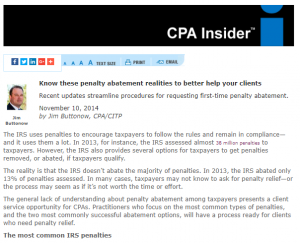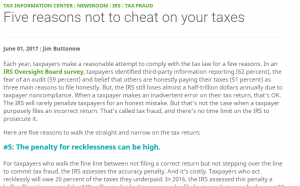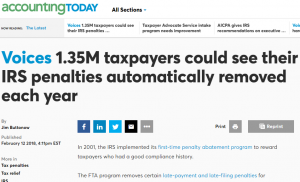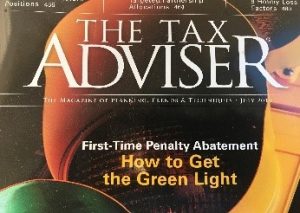In all IRS office and field audits, unreported income is a primary issue. The IRS takes great effort and uses several techniques to find unreported income. Be prepared for an IRS and read my AICPA CPA Insider article to analyze whether the IRS will question whether your client has reported all of their income. Failing to do so can result in a very long audit with a very suspicious auditor. Be prepared with a proactive answer by simulating these 5 actions the IRS will take in an audit to see if there is unreported income.
Know these penalty abatement realities to better help your clients
Learn about four reasons the IRS abates penalties – and the two most common reasons taxpayers actually use for penalty abatement: reasonable cause and first-time abatement. My AICPA CPA Insider article also addresses the most common IRS penalties and how to request abatement.
Five reasons not to cheat on your taxes
Cheating on your taxes can be costly- and its not the right thing to do. My H&R Block article on the costs and other reasons why you should not cheat on your taxes.
1.35M taxpayers could see their IRS penalties automatically removed each year
Another update article on the IRS’ first-time penalty abatement waiver. The IRS could soon make this “automatic” when you first incur a failure to file or failure to pay penalty. We will wait and see if this becomes the procedure for the IRS.
The first time penalty abatement waiver
1.65 million individuals qualify for first time penalty abatement. It can be used for individuals, business, and employers for the failure to file, failure to pay, failure to deposit and a few other common penalties. Most taxpayers and tax professionals do not know about it. Here is my article in the Tax Adviser that explains how it works. If you have any questions, please feel free to contact me.
First-time Penalty Abatement
This article sheds light on a useful, but often overlooked option within the IRS – First-time Penalty Abatement. As published in, AICPA CPA Insider, CPA Letter Daily, and Accounting Today. It provides the basic qualifications for First time penalty abatement from the IRS. Read the full article here.
